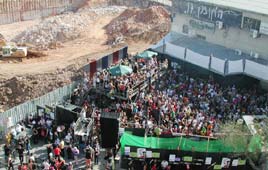
If I forget thee, O Jerusalem
There are Jerusalem residents - and there are many who are leaving
Indeed, they are joining many other friends and relatives, most of them secular and holding centrist or leftist political views, who have left Jerusalem in recent years, mostly to the country's coastal plain.
When they announce their decision, during Friday night social gatherings, the response of those staying behind is always the same: "another one has deserted," "the secular circle is narrowing," "they're leaving us here alone."
'Why live in that city?'
Meanwhile, during family gatherings, those who have chosen to depart mock us. What are you still doing there, living among the ultra-Orthodox and the Palestinians? They ask. Look how nice it is here in the center. Everyone around here is like us, just look at the crowded restaurants and coffee shops.
Why do you continue to reside in that boring city? They tell us.
And so, the capital's secular residents are increasingly burdened by a sinking feeling. Indeed, one no longer feels at home in the city of his birth.

Discotheque Haoman 17 is considered one of the country's hippest nightspots
This is not the case only in ultra-Orthodox or Palestinian neighborhoods, but also in public, seemingly secular places, which are quickly changing their character.
Some Jerusalemites say city has improved
Indeed, this is the sense at the malls, at movie theaters, and even on Emek Refaim Street, the city's trendiest district.
Some Jerusalemites actually claim the past decade has brought a marked improvement in the life of secular residents. Look, they say, at the many restaurants and cafés open on Saturdays and holidays, and at the thousands of youngsters going out on the weekends.
Those changes are negligible, however, in the face of the increasing sense of suffocation and social solitude of many secular Jerusalemites.
Uri Lupoliansky, the capital's current mayor, is ultra-Orthodox, but tens of thousands of adults and youngsters have been leaving the city since the late 1970s, with only few new secular arrivals taking their place.
City attracts religious Americans
Most students attending the city's Hebrew University come here from other places and do not stick around once they finish their studies. On the other hand, for 35 years now the city has attracted many religious American immigrants (and recently, some French ones).
The city's upscale Rehavia neighborhood, for example, who once was a blatantly secular neighborhood, has changed its face. Today, many of its inhabitants are the religious and ultra-Orthodox who have arrived from the United States.
Indeed, a similar process is already under way in other city neighborhoods, too.
It may be difficult to grasp the change by only looking at the surface. The Cinematheque film center attracts large audiences, the renovated Mahane Yehuda market has turned into an attraction that draws secular visitors from central Israel, and driving on the Sabbath is still possible in most city neighborhoods.
However, more than half of Jewish first graders come from the ultra-Orthodox community, while more than 20 percent are affiliated with the religious-traditional community.
Indeed, this is the face of the Jewish, adult-aged Jerusalem of the near future: a negligible secular minority, vis-à-vis an impressive ultra-Orthodox and religious majority.
And in this state of affairs, it is difficult to blame secular Jerusalemites who are planning to move, either in the near or distant future, to a place more commensurate with their character and social tendencies, where they do not feel like members of an increasingly extinct minority.
Sadly, it appears we are in advanced stages of partitioning the country – not between Palestinians and Jews, but rather, between Jews of the coastal plain and those who inhabit Jerusalem's mountains.
Tell us your thoughts about Jerusalem:
- Is it going "haredi" (ultra-Orthodox)?
- Are secular people really leaving?
- How is Lupoliansky doing?
- Is it becoming a "ghetto" for religious Americans?
- Even if all of the above are true, is that bad?
- What can and should be done to maintain Jerusalem as a cosmopolitan, diverse city?
Write to us at [email protected] or send us your comments via Red Email. You are also invited to respond through "Talkback," below.










